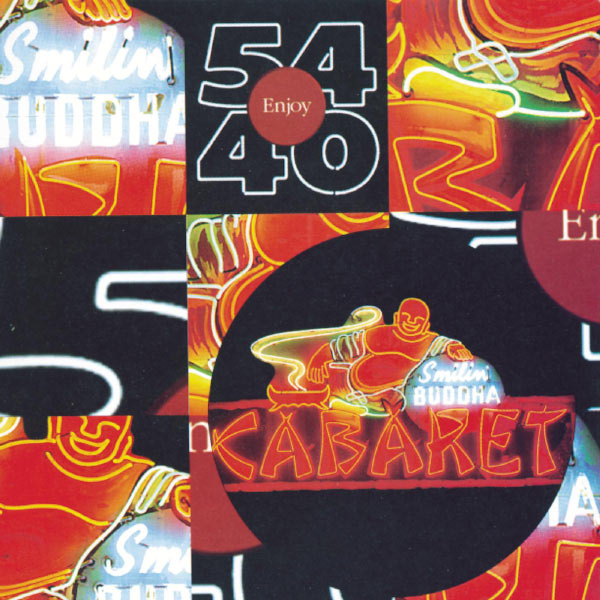54-40 is a weird band. Not weird in the sense that their music is particularly strange or that they’re overly quirky (though don’t get me wrong, they’re definitely quirky) What makes 54-40 weird is that they spent the first two decades of their career shifting all over the sonic spectrum. Most people don’t know this, but if you listen to their early independent releases on MO=DA=MU they sound more like Joy Division than you’d expect. Not surprising considering the band formed when vocalist/guitarist Neil Osborne and bassist Brad Merritt met and both discovered that they had a similar affection for post-punk.
In the 80’s they shifted from post-punk towards hard rock, in the early 90’s they got progressively louder and by the end of the decade they had embraced country music (back before country music was cool again) and soul. They even released a soul/dance record under the guise of “Paloma” with Coco Love Alcorn taking on vocal duties. They would dress in disguises and open their own shows.
“Smilin’ Buddha Cabaret” is the 54-40’s love letter to Canadian west coast punk. The album is named after a now-shuttered bar in Vancouver where they infamously played their first show – New Years Eve gig in 1981. The neon sign adorns the cover of the record. “Smilin’ Buddha Cabaret” is also their most scattershot record in their entire catalog. Straight-up punk songs like “Beyond The Outsider”, “Don’t Listen To That” and “Assoholic” are to be expected. But there’s also a fair bit of twang to be found on “Higher” and “Once a Killer” while “Radio Luv Song” manages to incorporate both elements into one twisted track.
The album also features some of 54-40’s darkest material in “What Buddy Was” (about an AIDS sufferer approaching his end) and “Friends End”. But the songs are placed next to lite fare in the form of kooky love songs like “Daisy” and the fuzzed out bliss of “Save Yourself”.
The lead-off track “Blame Your Parents” is one of 54-40’s all-time best songs and “Ocean Pearl” located somewhere in the middle is one of their biggest hits. I doubt a record like this would sell nowadays.
I decided on “post-grunge” as an accurate description of “Smilin’ Buddha Cabaret”. Even though it’s rooted in punk rock (so was grunge) I feel that the imprecise nature of the term reflected the variation of the material. Ask anyone what a post-grunge record sounds like and they’ll have a difficult time describing it. But at the same time, ask someone if a particular record falls under the “post-grunge” umbrella and they’ll have an easier time answering your question. Bands like Weezer, Garbage and Days of the New all fall under the post-grunge banner despite sounding nothing alike. The etymology of the term suggests that it applies as a successor or extension to grunge. But grunge itself was such a catch-all phrase. (listen to Nirvana and Pearl Jam back to back. They’re nothing alike)
But I digress…
After “Smilin’ Buddha Cabaret”, 54-40 wrote “Trusted By Millions” which was a louder, denser record with songs that were more disaffected and with more difficult material (“Stick To Milly” tackled the still-tricky topic of abortion). They’re both among my favourites but I have trouble deciding which of the two records I prefer. “Trusted By Millions” draws its strength from consistency. It’s a loud, thick, record throughout. But “Smilin’ Buddha Cabaret” best represents the era in which it was released. A time when bands were struggling for identity and throwing anything at the wall hoping it would stick. Nowadays it feels like bands decide on their sound first, then try to stick as close to it as possible, lest they alienate any of their fans. 54-40 took a chance with every record they released and based on their 30+ year career, it’s paid off for them over the long run.
